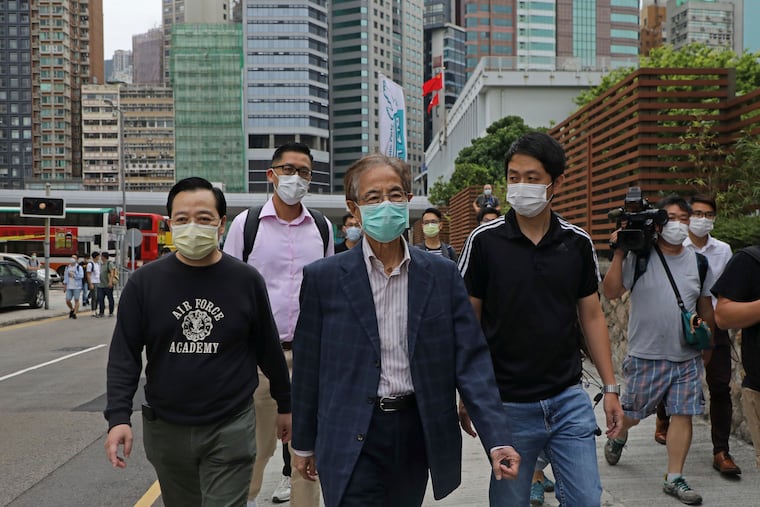China uses coronavirus as a cover for further crackdown on Hong Kong freedoms | Trudy Rubin
Arrests of leading pro-democracy activists reflects Beijing's lack of transparency on COVID-19 - and its efforts to promote its authoritarian model at home and abroad.

Last week, as the world was distracted by COVID-19, more than a dozen of Hong Kong’s leading pro-democracy activists were arrested at the behest of Beijing.
They included the 81-year-old veteran lawyer Martin Lee, known as the father of the democracy movement, and Jimmy Lai, the media tycoon who still dares to criticize the Communist Party.
Clearly, Communist Party leaders in Beijing see the coronavirus shutdowns as an opportunity to crush the movement that brought millions of protesters to the streets last year to defy Beijing’s efforts to curb their freedoms.
But the threat to Hong Kong democracy also reflects the growing threat that China’s agenda presents to the world.
As I saw in a visit to China and Hong Kong in November – when I interviewed Lee, Lai, and other activists — the pro-democracy movement was a huge frustration to Beijing.
In times past, Chinese leaders adhered to the “one country, two systems” accord, signed with Britain in 1997, and endorsed internationally, that promised Hong Kong could keep its civic freedoms for 50 years.
But Chinese leader Xi Jinping has pressed Hong Kong leaders to shred that 1997 commitment, including universal suffrage. The open Hong Kong system was an affront to his efforts to tighten Communist Party rule over China and shut down any sources of information that contradict the narrative from Beijing.
Yet Hong Kongers refused to be quiet. Last year’s protests were sparked when the territory’s leaders tried to pass legislation permitting their citizens to be extradited for trial in China, where courts operate at the dictate of the Communist Party.
» READ MORE: In Washington and Hong Kong, a fight to preserve democratic values I Trudy Rubin
Beijing was stunned by the hundreds of thousands who turned out for protests (mostly peaceful, but a few that deteriorated into violence). I interviewed teenagers, wearing gas masks for protection, who were passionate defenders of rule of law, having studied details of Hong Kong’s basic law in high school. (Can you imagine that here?)
Beijing was equally stunned when pro-democrats won a majority of district election seats late last year – in a true David-vs.-Goliath victory. And Xi Jinping no doubt blamed Hong Kong when Taiwan’s voters reelected a president who takes a hard line toward Beijing. That’s because the Hong Kong demonstrations made clear China’s disdain for the “one country, two systems” promise that Xi Jinping was also promoting for Taiwan.
But why arrest Martin Lee and other pro-democracy elders now (beyond the COVID-19 cover)? I put that question to Joshua Wong, the 24-year-old founder of the pro-democracy Umbrella movement, who faces trial for a previous arrest in May.
“Beijing’s intention is to silence the voice of dissidents before elections for the Legislative Council [Hong Kong’s lawmaking body] in September,” Wong told me by phone from Hong Kong. “They want to suppress even prominent senior leaders, like Martin and Jimmy Lai, who could influence those elections.”
Yet there is another reason to silence Lai and pro-democrats: Hong Kong’s amazing success in controlling the coronavirus early, in sharp contrast to the early debacle on the Chinese mainland. This success was based on an informed civic society, not on a hapless Hong Kong government beholden to Beijing.
With a population of seven million, Hong Kong has recorded just over 1,000 cases and four deaths, according to recent figures. ”We were able to overcome coronavirus better because we had no trust in Chinese information,” says Wong.
Doctors and nurses went on strike to force the Hong Kong government to close the border with the mainland. With a good health system, and a previous experience with SARS, Hong Kong citizens took it on themselves to social distance and wear masks. A still vibrant Hong Kong press reported details that the mainland press could not.
Which brings us to the broader message of Hong Kong’s freedom struggle to the world. It was expressed eloquently Thursday by the dignified Martin Lee on a webcast organized by the Foreign Press Association.
“The key to China is Hong Kong,” he argued. "If China wants to expand its influence in the world, it is important to show the world it always keeps its promises, its international agreements [as with the 1997 accord on Hong Kong freedoms]. Otherwise people will say, ‘How can you trust them?’ People will get afraid of China.”
Indeed.
On that matter of trust, Lee added: “It is important to keep Hong Kong free in order to support correct information on the virus and vaccines. Hong Kong people know the virus started in Wuhan.” (Of course, that is why Beijing wants to see Lai, owner of the Apple Daily newspaper, put in jail.)
It would be too easy to dismiss Hong Kong’s case as hopeless, 7 million vs 1.3 billion. Yet, as China promotes its authoritarian vision as superior to democracy, Lee’s words cut to the heart.
» READ MORE: In Hong Kong, young protesters risk all for democracy I Trudy Rubin
Asked if he fears prison, the slim, soft-spoken barrister replied: “The important thing all these years is that I am fighting for democracy, for rule of law. I devoted all my life to that cause and I am quite prepared to continue. I am at peace.”
“But I hope the world is watching,” he added. And it should be, because the experience with China’s dishonesty over COVID-19 is a reminder to world leaders of the need to stand up to Beijing’s misbehaviors.
One way to do that is to stand with Hong Kong.